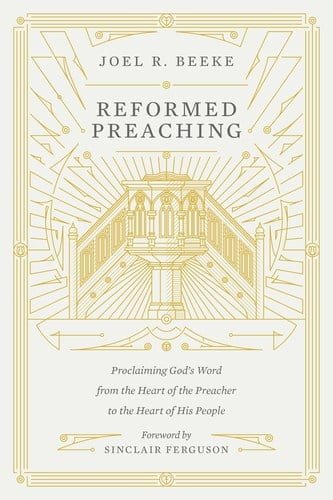⏱️ Estimated Reading Time: 4 min read
[et_pb_section fb_built=”1″ admin_label=”section” _builder_version=”3.0.47″][et_pb_row admin_label=”row” _builder_version=”3.0.48″ background_size=”initial” background_position=”top_left” background_repeat=”repeat”][et_pb_column type=”4_4″ _builder_version=”3.0.47″ parallax=”off” parallax_method=”on”][et_pb_text admin_label=”Text” _builder_version=”3.19.4″ background_size=”initial” background_position=”top_left” background_repeat=”repeat”]Dr. Joel R. Beeke is one of my favorite writers to read. I’ve lost track of how many books he’s written and how many of them I’ve read, but there is a common thread between them all- they are devotionally warm. One of Beeke’s goals in everything he writes is to warm his reader’s affections for Christ. Certainly, the Lord has used the Reformers and the Puritans to shape Beeke’s thinking on this matter, and in his latest book, Reformed Preaching: Proclaiming God’s Word from the Heart of the Preacher to the Heart of His People, we see this even more clearly.
I personally think this book is Beeke’s greatest accomplishment thus far. I am so thankful to God for Beeke’s desire to shape and train pastors, and I will make this book required reading for any aspiring pastor or student of God’s Word.
Beeke divides the book up into three sections:
- Reformed Experiential Preaching Defined and Described
- Reformed Experiential Preaching Illustrated
- Preaching Experientially Today
For those of you not familiar with the term reformed experiential preaching, Beeke defines it as “preaching that applies the truth of God to the hearts of people to show how things ought to go, do go, and ultimately will go in the Christian’s experience with respect to God and his neighbors- including his family members, his fellow church members, and people in the world around him. Even more simply, we could say that the Reformed experiential preacher receives God’s Word into his heart and then preaches it to the minds, hearts, and lives of his people.” (41)
After spending the first section of the book really exploring the makeup of that definition (again, in a very devotional way), Beeke introduces us to men in church history such as Zwingli, Bullinger, Oecolampadius, Calvin, Beza, Perkins, Rogers, Sibbes, Preston, Goodwin, Shepard, Bunyan and more. His focus in section two is on the Reformers, Dutch Reformers, Puritans, and 18th, 19th, and 20th century preachers who preach in the same spirit of those preachers in the Reformation and Puritan age. Not only is this section an examination on how these men preached experientially (or experimentally as they referred to it), but Beeke is biographical as he discusses these men, their lives, and ministries.
By the conclusion of sections one and two students have a robust definition of reformed experiential preaching, they are tethered to church history, and now they move to how to apply what they’ve learned in their current ministry context. It is in this last section that Beeke is refreshingly honest. I’ve listened to him lecture on elements of this book in the past and Beeke does a great job with providing bumper rails for his students. He spends time on what should be emulated from those who have gone before us, but he also spends time on what should not be emulated. This last section is highly practical. Beeke desires pastors to “preach with balance” (352).
I could make this book review extremely long. Beeke’s work is close to 500 pages, but in an effort to be brief, I will say, if you’re a pastor, buy this book and read it. If you’re training to become a pastor, even better- get a jump start, and read this book. If you listen to sermons (the rest of you), read this book and then give it to your pastor as a gift. Not all books are worth your time and money, this one is. Trust this book. Open your soul to this book and be encouraged by Beeke’s hard work.
[/et_pb_text][/et_pb_column][/et_pb_row][/et_pb_section]



